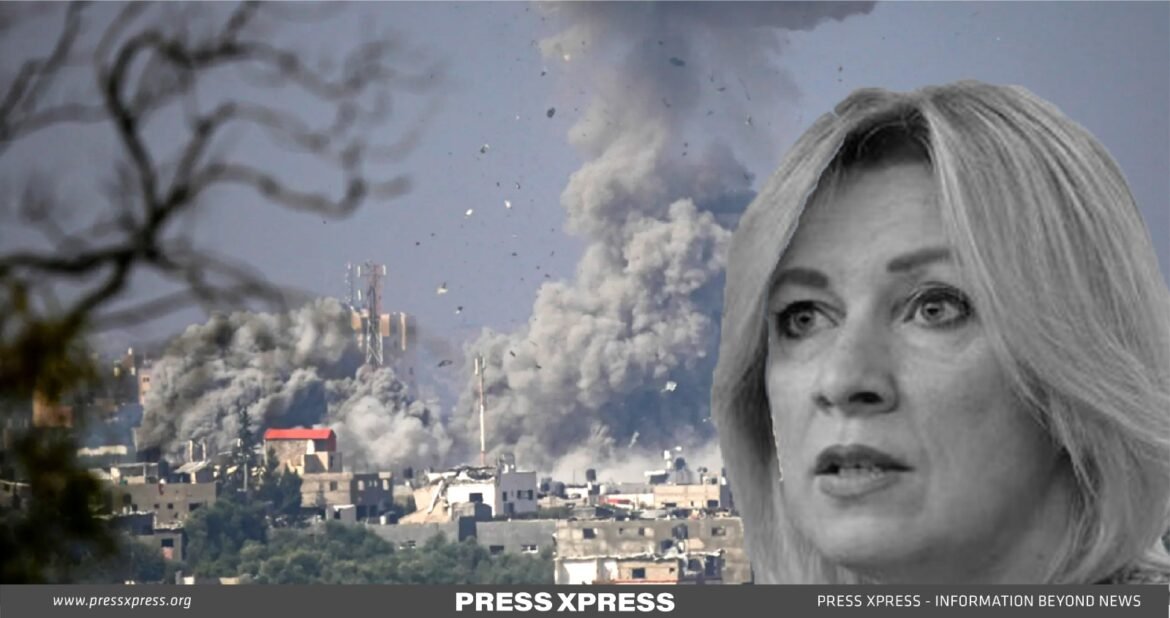Russian officials have joined the international community in expressing profound concern over remarks made by an Israel junior minister. These comments, made by Heritage Minister Amihai Eliyahu, have raised eyebrows and sparked a fierce debate. Eliyahu seemed to express openness to the idea of Israel carrying out a nuclear strike on Gaza, a statement that has left the world in shock.
The Russian government’s reaction came on Tuesday, 6th November 2023, several days after Minister Amihai Eliyahu made his controversial statement during a radio interview. He suggested that the nuclear option could be “one way” to deal with the ongoing conflict in Gaza. This not only implies that Israel is in possession of nuclear weapons, something the country has never officially admitted, but also that it might be willing to use them.
Russia’s Reaction
Maria Zakharova, the spokeswoman for Russia’s foreign ministry, emphasized that the primary concern is Israel’s apparent acknowledgment of possessing nuclear weapons. She posed a crucial question, “It turns out that we are hearing official statements about the presence of nuclear weapons?” This revelation, if true, raises significant questions about international oversight and accountability.
Moscow’s response to the situation came on Tuesday, following Eliyahu’s controversial radio interview. The Israeli minister’s comments suggested that Israel might possess nuclear weapons and is willing to use them as a means of dealing with Gaza. This declaration has left the international community deeply troubled. Maria Zakharova, Russia’s foreign ministry spokeswoman, pointed out that the central issue is Israel’s apparent admission of having nuclear weapons. “Question number one,” Zakharova stated, “it turns out that we are hearing official statements about the presence of nuclear weapons?” Her remarks raise significant concerns about transparency and the role of international organizations in monitoring nuclear proliferation.
Russia’s Indirect Involvement
In the ongoing Israel-Hamas conflict, reports are indicating that Russia’s paramilitary group, the Wagner Group, is potentially entering the fray and offering air defense assistance to Hezbollah, an Iran-backed organization based in Lebanon. This involvement raises concerns about the escalation of the conflict, as Wagner Group intends to supply the Russian SA-22 Greyhound system, a sophisticated air defense system capable of intercepting aircraft, cruise missiles, and precision munitions. The situation has been described as “very concerning” by Pentagon spokesman Brig. Gen. Pat Ryder, although it’s unclear if the system has already been delivered. Monitoring of discussions between Wagner Group and Hezbollah is underway, emphasizing the gravity of the issue. Notably, Wagner Group had previously attempted a mutiny against Russian leader Vladimir Putin in June, and it is a state-financed private military company formerly led by Yevgeny Prigozhin, who later died in a plane crash. The potential involvement of this group in the Israel-Hamas conflict adds complexity and uncertainty to an already volatile situation.
Israel’s Nuclear Arsenal
The question of Israel’s nuclear capabilities has long been shrouded in secrecy. Israel has never officially confirmed the possession of nuclear weapons, which makes Eliyahu’s statements even more striking. The Federation of American Scientists estimates that Israel may possess around 90 nuclear warheads. The potential existence of these weapons, combined with the suggestion of their use, has sparked global alarm and demands for greater clarity.
Global Response
The international community’s response to these comments has been swift and severe. The United States, a close ally of Israel, swiftly condemned Eliyahu’s remarks, deeming them “wholly unacceptable.” Deputy State Department spokesperson Vedant Patel emphasized the importance of refraining from hateful rhetoric in the midst of the Israeli-Palestinian conflict. The implications of a nuclear strike on Gaza are deeply unsettling, and the need for responsible discourse is paramount.
Across the Arab world, there has been widespread condemnation of the remarks, reflecting the fear and concern that this kind of rhetoric could further destabilize an already fragile region. Iran, a regional power with its own contentious history, has called for a swift international response. Iranian Foreign Minister Hossein Amirabdollahian took to social media to demand action from international bodies, stating, “The UN Security Council and the International Atomic Energy Agency must take immediate and uninterrupted action to disarm this barbaric and apartheid regime.” The urgency of the situation, as expressed by Amirabdollahian, underscores the gravity of the issue at hand.
Huge lives lost; thousands displaced
Israel’s ongoing advance toward Gaza City has included air strikes on the densely populated Jabalia refugee camp, targeting leaders of Hamas’s Qassam Brigades. These strikes have resulted in at least 195 Palestinian casualties, 777 injuries, and 120 people still missing, with witnesses describing the situation as a “massacre.” Israel has confirmed the elimination of two Qassam Brigades leaders in Jabalia, escalating the conflict.
This chapter in the Israel-Hamas conflict began with a surprise assault by the Palestinian group on Israeli territory. Israel claims this action led to the loss of around 1,400 lives, mainly civilians. In retaliation, Israel’s bombardment of Gaza has claimed over 9,000 lives, including more than 3,700 children, and has caused extensive damage to the territory’s infrastructure, displacing hundreds of thousands and portraying a grim picture of the ongoing crisis.


